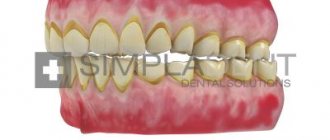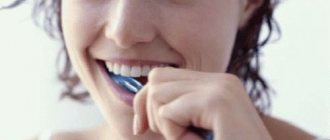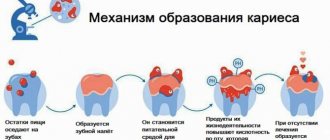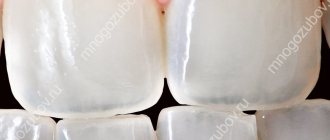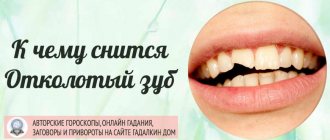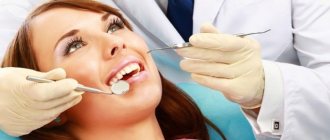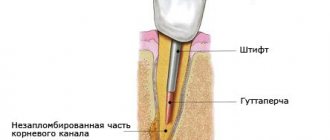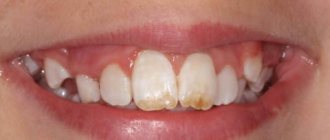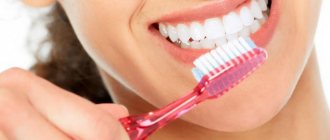Where to look for the right doctor? What to do if you are offered to remove a tooth? Are there everlasting implants? Tells Vice-President of the Dental Association, Director of the Professorial Dental Clinic, Academician of the Russian Academy of Sciences Valery Leontyev.
Article on the topic: Stop periodontal disease!
Is it possible to slow down the development of the disease Lidia Yudina, AiF: Valery Konstantinovich, many diseases worsen in the off-season.
Are dental problems considered seasonal ailments? Valery Leontyev : Dental diseases do not have a clear connection with seasonality. However, in cloudy, rainy, cold weather, bad teeth remind you of themselves more often. Especially often at this time, periodontal diseases (the tissues surrounding and holding the tooth) make themselves felt - periodontitis, gingivitis, etc. This is explained by the fact that people with dental problems have weakened immunity, and bad weather weakens it even more.
In general, the condition of teeth depends on the region of residence. Residents of southern countries, as a rule, have stronger and healthier teeth than northerners. It has been noticed that for southerners who move to a northern country, where there is not enough sun, fresh vegetables and fruits, and there is little fluoride in the water, this quickly affects the condition of their teeth.
Click to enlarge
— It turns out that the residents of our country are born with dental problems?
— The most unfavorable areas from the point of view of dentists are regions with low population density (the Far North and the Far East). The poor dental condition of residents of other regions cannot be explained solely by climatic conditions. The main reason for bad teeth among residents of our country is poor oral hygiene and excess sugar in food.
Headache
Many people have a question: how can headaches be related to teeth? This symptom can have many causes - from increased intracranial pressure to overstrain of the masticatory muscles.
The connection between headaches and dental problems lies in our anatomy. Our dental system consists of teeth, bones and muscles. Headaches are often associated with overexertion and improper muscle function. There are a lot of them responsible for the movement of the jaws. The largest muscle of mastication is the strongest in the body. And when it spasms, a person may feel like he has a headache, because... the pain may be concentrated in the temple area.
Why can chewing muscles hurt? For them to work correctly, there must first be teeth in the mouth. Secondly, these teeth must be the correct shape and located in the correct position - this determines a person’s bite. It should be understood that the bite changes in one way or another every day, because teeth naturally wear out. And in the conditions of modern nutrition - with a lot of sugar - the dental system is destroyed much faster. The bite changes, the load on the chewing muscles increases, because they have to “work” for themselves and for teeth destroyed by caries.
Nuts are provocateurs. Foods that cause headaches Read more
The second point is related to psychosomatics. People clench their teeth when under emotional or physical stress. If a person has “swayed” large masticatory muscles, that is, he often “works with his nodules,” then he automatically falls into the risk zone for developing headaches.
The third factor is long-term use of chewing gum. In essence, chewing gum is a hygiene product, just like toothpaste. You should use it for no more than 3-5 minutes to clean your teeth of food debris. When people start chewing it constantly, they perform unnecessary training of the masticatory muscles, which leads to hypertrophy.
It is not difficult to understand that your headache is due to problems with the masticatory muscles. For chronic pain, at the moment when this negative symptom is felt, you should clench your teeth and feel your face. In the area of the temples, above and around the ears, a person will feel the masticatory muscle moving under the fingers. If the point of pain and muscle compression coincide, the cause of the headache is a spasm of the masticatory muscle.
However, not all dentists can understand what’s going on here. Typically, this problem is dealt with by specialists in the field of functional diagnostics, gnathology or dental neurology.
Article on the topic
Shot in the back. An expert on how to treat lower back pain
Bacteria
Next, bacteria are introduced into the already weakened cells, which are able to completely destroy the cell, feeding on its insides. According to the nature of their development, they are divided into those that are able to divide and grow only inside the cell (chlamydia, etc.) and those that multiply both inside and outside the cell (mycoplasma, legionella, listeria, rickettsia, etc.). The variety of lesions they cause is explained by their sensitivity to different types of host cells (human, animal).
Intracellular bacteria:
Chlamydia:
- chlamydia trichomatis (trachoma, urogenital chlamydia and pneumonia of newborns, lymphogranuloma venereum, arthritis, arthrosis, heart damage)
- chlamydia from birds (ornithosis - pneumonia, fever)
- chlamydia pneumoniae (pneumonia, acute respiratory infections, atherosclerosis, bronchial asthma)
Rickettsia:
- rickettsia (rickettsiosis, typhus)
- rohalimia (trench fever, cat scratch disease)
- Klebsiella (Congo red fever)
Escherechia:
- Escherechia (maculopapular rash)
- bartonella (bartonellosis)
By multiplying in cells, intracellular bacteria are protected not only from various influences from the human body, but also from the effects of most antibacterial drugs that are not able to penetrate inside cells. Extracellular bacteria feed on already decomposed cells, “melting” them and turning them into pus. They are a kind of orderlies (cleaners) of the body, cleaning out diseased organs and systems.
Extracellular bacteria:
- Staphylococcus (skin pustular infections, endocarditis, pneumonia, arthritis, osteomyelitis, peritonitis, eye infections, toxic shock syndrome, food toxic infections)
- Oral sticks (gingivitis, stomatitis, endocarditis, sepsis)
- Streptococci (pharyngitis, postpartum infections, neonatal sepsis, bacteremia, meningitis, arthritis, genitourinary tract infections, pneumonia, sinusitis, otitis of the middle ear, rheumatic attack, abscesses of the lungs, liver, brain)
- Bacilli (Anthrax, bacteremia, septicemia, meningitis, eye infections, pneumonia, endocarditis, food poisoning
- Corynebacteria (diphtheria, erythrasma, skin lesions in the axillary and groin area, cellulitis, septicemia, brain abscesses and osteomyelitis)
- Clostridia (gas gangrene, foodborne illnesses, necrotic enteritis, tetanus, botulism)
- Gonorrheal bacillus (infections of the lower parts of the genitourinary tract (cervicitis, urethritis, abscesses of the glands adjacent to the vagina), infections of the upper parts of the genitourinary tract (endometritis, epididymitis, pelvic inflammatory diseases), infections of other organs and tissues (proctitis, pharyngitis, blenorrhea, pelvic peritonitis and perihepatitis, pharyngeal gonorrhea), disseminated gonococcal infection; meningococcal infection)
- Pseudomonas (skin lesions, abscesses, infection of burn lesions, keratitis, conjunctivitis, otitis of the external ear, meningitis, bacteremia, endocarditis, enteritis, para- and rectal abscesses, pneumonia, urinary tract infections, osteomyelitis and arthritis)
- Flavobacteria (colonize wounded surfaces, respiratory, intestinal tracts, organs of the genitourinary system, severe meningitis of newborns, septicemia, endocarditis, pneumonia).
Intracellular and extracellular bacteria not only get along with each other, but, participating in the cycle, eat what the previous microorganisms destroyed. They can be compared to jackals and hyenas, eating what is left of the victim after a tiger.
Back pain
Due to improper functioning of the masticatory muscles, a headache may occur, and the bite may change due to incorrect posture. If there are any disturbances in the correct position of the spinal column, the respiratory system will compensate for them by moving the neck back and turning it. Moreover, the connection between bite and posture works in both directions. That is, an incorrect bite can also cause changes in posture. With an incorrect bite, the first and second cervical vertebrae do not align correctly relative to each other. The body, in attempts to compensate for all this, leads to other disorders. Because of this, in particular, back pain can begin.
Viruses
Viruses feed on the energy of cells, that is, they seem to de-energize them.
Viruses very clearly maintain territory, that is, each of them lays claim to a specific organ or system. Even different types of the same type of virus have their own localization. In the course of my medical work, I became convinced that your immune system is brought to the point of exhaustion (not to be confused with tension) by viruses and only viruses.
DNA viruses: pycnoviruses, iridoviruses, herpesviruses, adenoviruses, parvoviruses, hepadnaviruses, hepatitis B.
RNA viruses: paramyxoviruses, rhabdoviruses, arenaviruses, orthomyxoviruses, retroviruses, reoviruses, flaviviruses, calciviruses, hepatitis A, C, D, E, G.
Clinical manifestations: respiratory viral infections, pneumonia (pneumonia), maculopapular rashes on the skin and mucous membranes, blistering rashes, meningitis, encephalitis, hepatitis, diarrhea, conjunctivitis, genital lesions (herpes simplex virus, adenovirus, HIV), congenital and perinatal (postpartum) lesions (cytomegalovirus, herpes, rubella virus, enteroviruses, HIV).
Insomnia and depression
During sleep, an extremely important biological process occurs - rest of the human nervous system. Therefore, it is important to have complete and high-quality sleep. Otherwise, a person cannot feel normal, the body does not work at full capacity. Bruxism, or teeth grinding during sleep, can interfere with sleep. Grandmothers' belief that it appears from worms is a myth. Grinding predominantly develops against the background of stress and depression. According to statistics, the vast majority of people currently have bruxism. At the same time, permanent is an extra load on the teeth, leading to their faster destruction, grinding, changes in bite, etc.
Poor quality sleep at night leads to fatigue, decreased performance and worsening stress and depression.
Go to sleep and get enough sleep. How to get rid of insomnia Read more
A person cannot control teeth grinding at night on his own, so he needs the help of specialists. Often, patients with this problem are recommended to wear a special device - mouth guards or splints, which are an ideal “arch support”. This device is placed on the lower jaw.
Protozoa
The decomposed cellular substrate in the organ is attacked by protozoa, which, processing this waste, act as garbage collectors in containers. Thus, dead cells, bacteria, and toxins are not just scattered throughout the organ, but cleaned, aligned cavities. This process is dynamic, each type of introduced microorganisms has time to become saturated and grow, multiply, that is, give birth to offspring.
The process continues until the immune system says: stop! It sends lymphocytes, leukocytes, macrophages, antibodies, sends energy and, depending on how well they cope, either recovery, improvement, remission (subsidence) occurs, or the disease turns into a sluggish chronic process. Protozoa are localized in the skin, eyes, tongue, intestines, liver, kidneys, bladder, genitals, etc.
BACTERIA AS A SOURCE OF DISEASES
A diseased tooth is a constant source of infection for the body as a whole. Because of banal caries, the entire immune system suffers. A person with caries cavities in his teeth regularly falls ill with colds and viral diseases; ailments that have become chronic are difficult to cure.
It has been discovered that about 350 different types of bacteria thrive in the oral cavity. Some of them can have an extremely negative effect on the body.
It has been noticed that the condition of the teeth can determine disharmony in the functioning of the liver, pancreas, joints, and gastrointestinal tract.
Thus, the bacterium Helicobacter pylori, which is always present in dental plaque, plays a fatal role. It has been proven that it causes stomach ulcers.
Members of the gingivalis family contribute to poor blood clotting, which in turn causes blood clots. Today it is believed that 70% is the percentage by which the risk of developing a cardiovascular disease increases solely due to poor quality oral care.
Eliminating dental diseases
Having eliminated dental problems, relieved inflammation and removed nerves, you need to contact an ophthalmologist again. The doctor must conduct a comprehensive examination and, if necessary, prescribe a course of medications to maintain vision functions. In some cases, the parameters of corrective glasses or lenses may be revised. It is not uncommon that after stabilization of the oral health, many ophthalmological problems go away.
On the website zakazlinz.ru you can make an appointment with an ophthalmologist, as well as purchase various contact correction products to ensure high clarity of vision and wearing comfort.
TEETH AND MEMORY
The bacteria that are on the teeth lead a fairly active life, the result of which is acids that slowly destroy the enamel, which leads to the occurrence and development of caries, and then pulpitis and periodontitis. This can lead to tooth loss, which negatively affects your appearance. Losing several teeth adds extra years to a person, which is especially unpleasant for the female audience. However, that's not all.
All over the world, studies are underway on the effects of various body systems on each other. Japanese scientists made an amazing discovery. They determined that the more teeth lost, the worse the memory. An experiment on four thousand people over 65 years of age confirmed a direct correlation between infections that contribute to tooth loss and catalysts for inflammation in the brain. Under the influence of infections, neurons die and memory deteriorates. At the same time, mood swings and unmotivated irritability are also observed.
TEETH AND HEART
A study conducted at Indiana University on the impact of oral hygiene on heart function confirmed fears that not only inflammatory gum disease, but also tartar and plaque contribute to an increase in the level of white blood cells in the blood, which is one of the precipitating factors of a heart attack.
Periodontitis itself leads to a significant risk of strokes and heart attacks. Bacteria spread throughout the body, weakening the walls of blood vessels, which over time leads to serious heart pathologies.
More detailed information can be found at the link https://emex-medical.ru/treatment/lechenie-aritmii-v-germanii/
Types of fungi
Candida are representatives of normal microflora. Several types of candida are known, which can also be pathogens. Fungal gastroenteritis is observed in severely weakened children and the elderly, as well as people of any age with significant immune deficiency of various origins. They are characterized by a gradual onset, bloating, infrequent loose foamy stools, rumbling and various soreness, nausea, vomiting, and cramping abdominal pain. In very severe cases candidasepsis may occur. Secondary infection easily develops on the affected surfaces. The disease is getting worse. Such a course of candidiasis is possible only in a dirty intestine, with blockages from a mixed meat and dairy diet in the body with a high deficiency of silicon, which is capable of excreting candida with feces. In practice, 90% of those consulted suffer from candidiasis.
Cryptococci - cause subacute or chronic deep mycosis. Most often (70%) this disease occurs in people with a mixed diet who have overloaded the enzymatic apparatus of the stomach. In such cases, even baker's yeast can cause cryptoccosis due to the infinitely large expenditure of acid to neutralize alkaline enzymes coming from the mouth with carbohydrate foods that were eaten along with protein. To get rid of this disease, it is necessary to remove the root cause of the disease - overload of the acid-forming gastric mucosal bioapparatus, use only separate nutrition, cleanse the intestines, and only then will antimycotic treatment be successful.
Penicildia - cause deep mycoses, caused by a variety of green molds that can affect the skin, mucous membranes, external auditory canal, and internal organs. Penicilliums occur after the use of antibiotics. Nocardia asteroides are aerobic, immobile formations that occupy an intermediate state between fungi and bacteria. Most are saprophytes, but can cause diseases in humans and animals. Nocardiosis can be expressed as mycetoma -. a tumor in the lungs consisting of a dense plexus of mold.
A close relative of Nocardia asteroides is Actinomycetes isrielii. They cause severe mycotic lesions of the cervicofacial region, chest and abdominal cavities - granulomas. This fungus is most often found in people living in areas of high radiation, as well as working in hazardous chemical production.
Mucor fungi cause a disease very similar to tuberculosis - mucophomycosis.
Aspergillus is a fungus that includes many species. Some of them are pathogenic. They are capable of deeply affecting tissues. They release toxins and give rise to malignant formations.
Geotrichosis is a disease caused by fungi that attack the mucous membranes. They accompany diseases - otitis media, sinusitis.
Trichophyton is a fungus that causes diseases of the skin, hair, and nails. It is rare to find a person who is not contaminated with trichophyton.
Trichophytis - causes ringworm disease. Trichophytosis can be superficial or chronic. Superficial trichophytosis is characterized by the appearance of erymatous peeling on the scalp. The fungus penetrates the hair, destroys it, the hair breaks, which is why the name “ringworm” is associated.
Epidermophyton floccosum is the causative agent of lichen nigricans. This disease manifests itself as slightly scaly dark brown or black spots, most pronounced on the extremities. Penetration of the fungus into the skin can be deep, and upon recovery, when the black spots disappear, the skin regains its ability to pigment (change color from exposure to the sun) for 2-3 years. At this time, non-tanning spots from ringworm black appear on the arms and legs. The disease recedes with the usual antimycotic treatment with celandine juice.
Microsporiums are fungi that cause the disease microsporia, which affects the skin, hair and nails. Exposure to all kinds of creams, ointments, powders and rubs either does not give a healing effect, or gives a very short-term improvement in health. To completely get rid of microsporia, it is necessary to take antimycotic treatment from inside the body.
Mycosis fungoides - causes the disease mycosis fungoides - a malignant tumor lesion of the lymph vessels, the fungus initially settles on the skin, and then colonizes the lymphatic system.
Mycoplasmas Fluor - cause inflammatory processes mainly in the respiratory organs and in the genitourinary system.
Sporothrix is a fungus that attacks muscles, bones, and internal organs.
All fungi produce poisons that cause a wide variety of allergic reactions. Toxins from aspergilus fungi have a toxic effect on the liver.
Yeast species: Candida, Candida albicans, Cryptococcus, Trichosporum, Saccharomyces.
Molds: trichophyton, microsporium, epidermiphyton, aspergillus, mycosis.
